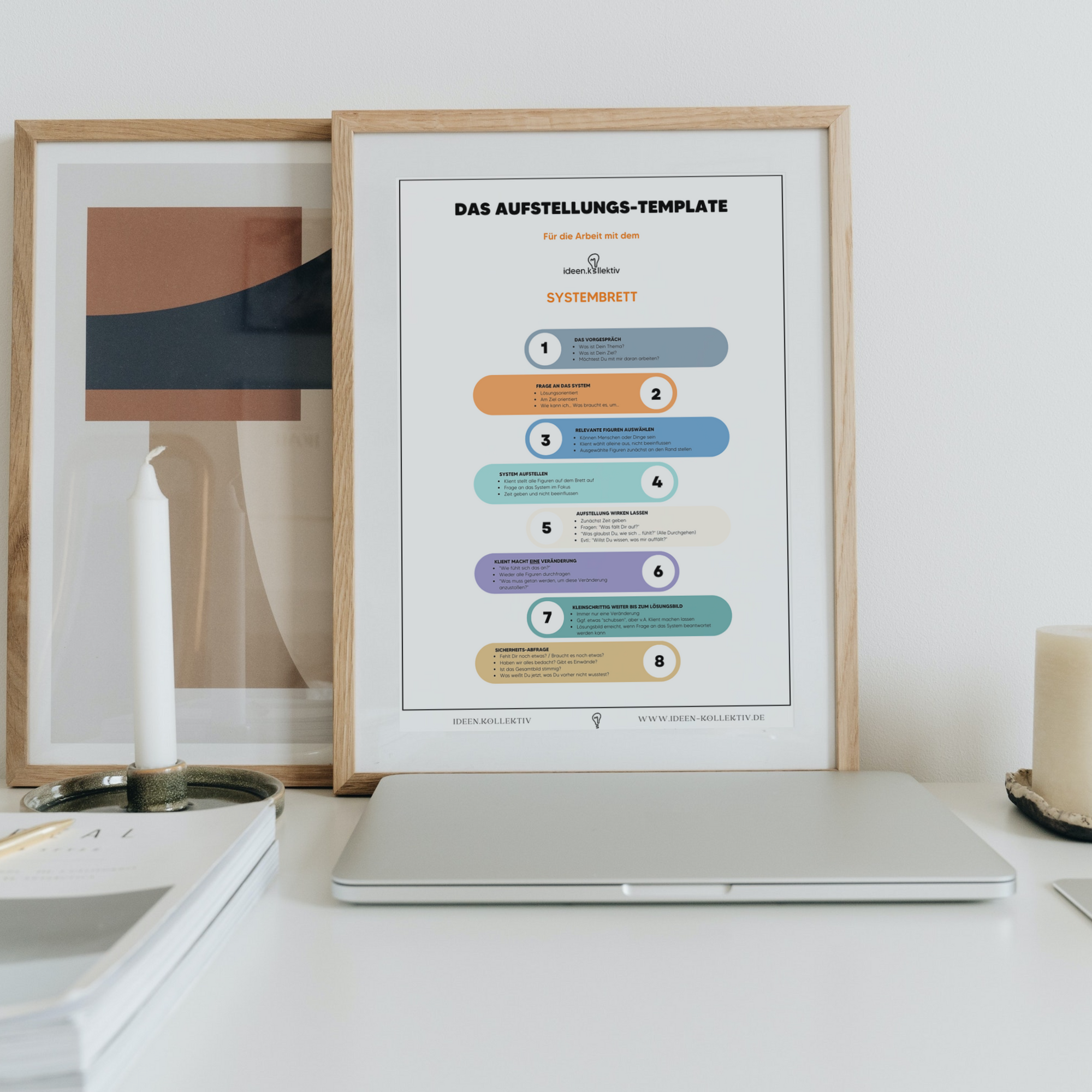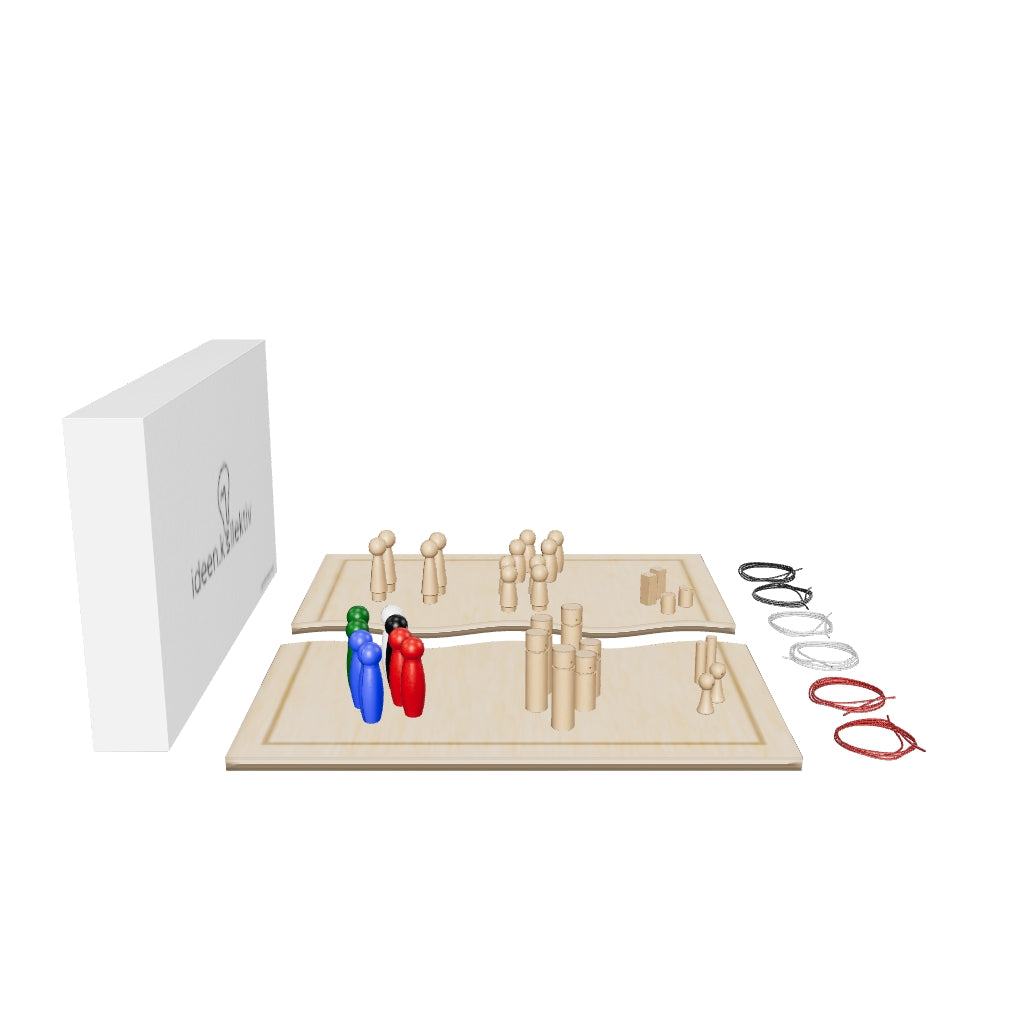Philip is the host of the ideen.kollektiv video course and the podcast “Club der Väter”. He is known on social media, from appearances on ZDF and in many other podcasts. With the expertise from his work as a systemic coach and consultant for families and especially fathers, he sets out to answer the question of what the father role should look like in modern families.
First, introduce yourself to everyone who doesn’t know you yet.
Hello everyone, my name is Philipp Bandholz and I am a coach for fathers. I am an author, speaker, coach and trainer, have been working with fathers for six years now, have been a father myself for eight years and founded the Fathers' Club just over two years ago and have committed myself to the mission of helping fathers to lead the happy, harmonious, stable family life they have always dreamed of.
What connection do you have to ideen.kollektiv?
I have known one of the two co-founders, Sebastian Hagenbruch, for about ten years. We used to make music together and when I was training to be a systemic coach, he started developing system boards at the same time. That was a coincidence, but it brought us together again and I then did an introductory course for ideen.kollektiv for people who are interested in the system board, to explain how to work with it. Since then, I have been using the system boards and other tools from ideen.kollektiv myself and occasionally give my feedback on these products to help develop them further. Overall, I am a big fan of the work that ideen.kollektiv does.
You've had a remarkable journey as a father coach. What initially motivated you to take this path?
Most radical decisions arise from great pressure or great pain. For me, it was the latter. What set the journey in motion for me was the divorce from my first marriage. This experience was very painful for me and I swore that it would never happen to me again. Today I know that this motivation is not necessarily healthy, but it is also very powerful and so I immersed myself in the subject for years and learned everything I could and everything I could get my hands on about the male-female dynamic and fatherhood. I am now happily married and have another daughter with my second wife and I am looking forward to having more children in the coming years.
Another important issue is certainly the balance between work and family commitments. What strategies do you recommend to parents to find and maintain this balance?
The most important point that needs to be mentioned first is mindfulness. And by that I don't mean any spiritual blah blah and looking into the candle, I mean listening to your gut feeling and having access to your body and your feelings in order to understand when you are working too much, when you are spending too little time with the children or neglecting an important aspect of your life. It takes constant attention to understand which part of the family or life is being neglected. And it is almost always some part. From a father's perspective, I sometimes describe family as a giant soap bubble floating through a room. And it is my job to ensure that this soap bubble does not touch any walls. So I always have to look at which side I am pushing or blowing from a little so that my system becomes stable again. For example, if I spend a lot of time with my daughter because she needs it, I may be neglecting my wife a little bit. If I then focus on my wife, I notice that my job is being neglected a little bit, then I concentrate on work again because an important project is coming up and then I notice that my second daughter needs me right now and so on. So I need attention and real presence, to really have these insights, and ideally before anyone else in my family notices or conflicts or real problems arise. I call this the early warning system. Another important point is the guiding principle: quality over quantity. So it is less important to spend a lot of time with my family than to really be fully present, to be there when I spend time with my family. You would rather spend an hour with your wife, very intensively and with full attention, without a cell phone and distractions, than to sit next to her for three hours while you are constantly busy with other things. So this guiding principle applies even more to men who are very busy. And even for men who are normally busy or not very busy, it is important to take time out, to take time for themselves and to recharge their batteries, so that they can then be fully present and focused on their family again.
Your personal story shows that you have been through difficult times yourself. How has this experience shaped your view of family and relationship issues?
Nothing has shaped my view of these questions more than my own separation, because I had so many questions: How did this happen? What did I do wrong? And so on. And all of these questions were answered. The key realization for me was that it is essential for a relationship to understand the dynamics between a male and a female part of the relationship. This also applies to homosexual couples. Going into this in depth would take too long here. For that, you can listen to the Club of Fathers podcast or follow the YouTube channel. But understanding that women on average think differently to men and understanding how my wife thinks and ticks and how I think has led to me not having an argument for five years, for example. A small note on this: We argue and we have conflicts. But arguments are emotional, not productive and energy-sapping. And I haven't had that kind of argument for five years now because I understand that my wife is mostly concerned with how she feels about certain situations, while I tend to look at things more rationally, logically and on a factual level. This realization of fully engaging and understanding the other person in the relationship has changed my life forever.
Can you share a concrete case study from your coaching practice in which the system board played a crucial role?
The system board is a great way to make hidden dynamics in families or companies visible and therefore conscious. I could give hundreds of examples here, but I will take an ideal example: Klaus had great difficulty relaxing. He always had the feeling that he was not doing enough, no matter how much he did, and his family suffered greatly as a result. He could hardly spend time with his two sons and enjoy it because he was still thinking about having to do a lot of things for his job or around the house. This became a great burden for him and he said he was close to burnout. We then looked at the issue using the system board and, after an intensive preliminary discussion, set up his family and his two parents. So his wife, his two sons, him, his mother and his father. It became clear that his father was very close to him, and we analyzed the situation using questioning techniques to find out why the figures were standing the way they were. His sons and his wife were standing very far away from him and were not facing him. The result was his realization that he was still unconsciously trying to meet the expectations of his father, who was never satisfied with him. He used to be criticized if he brought home an A or an A minus in a test. And his father always focused on the things he could have done better. On this basis, we were then able to start a successful coaching session and design the father's solution process so that today he is able to relax, leave tasks aside sometimes and actively enjoy situations with his children. His relationship with his father has also improved significantly because he has managed to bring more relaxation into it.
You are also an expert in interpersonal communication in the broadest sense. What do you think is important to improve communication within a group, such as a department, school class, social institution or family? What is the common denominator?
I could name a lot of points here, but I'll choose a very important one. And basically the answer is in the question, namely the common denominator. It is very important for a group to find a common denominator and this should be a vision. If all group members, system members, in a group are clear about why the group does what it does, where it wants to develop, what the direction is and there is agreement, then that is the basis of all communication. And the problem is that this big goal, the overarching vision of a group, is quickly lost sight of and people get lost in the minutiae. My clients often argue with their wives about the untidy kitchen, even though it is actually about a general trust issue or the feeling of not being seen. The discussion about the kitchen cannot then be conducted positively even with the best communication tools, because we have to understand the core of the problem.
George Bernard Shaw once said: "The greatest problem in communication is the illusion that it has taken place." Can you give us some examples from your practice that bring this quote to life and show how such misunderstandings arise and how they can be overcome?
I would add to George Bernard Shaw's quote and say: "The biggest problem with communication is the illusion that it is complete." Because communication takes place around the clock. The partner who turns his back to me, the partner who looks at his cell phone while talking to him. That is communication and it takes place around the clock and not just when we are talking to each other. It is important to understand that such behavior leads to hurt, which usually remains unspoken and then comes up in the next argument in the form of feelings, anger, for example. It is best if we manage to feel and perceive these things, hurt, pain, sometimes fear, these negative feelings that arise in such moments, and become aware of them and then work with them so that we can remain calm in the next argument and resolve a conflict in a factual and calm manner without it escalating into an argument, which is emotional and usually not productive.
Thank you for your time and valuable input! Last but not least, we would be interested to know what your plans and visions are for your coaching and how would you like to support fathers and families in the future?
My work is specialized in fathers. That means that we at the Fathers' Club help fathers to bring their relationships with their wives and children to the best possible level. And first of all, it's about helping more fathers, reaching more fathers, because we see what great results our participants achieve. So we definitely want to give more fathers access to our work. For example, my book is coming out in the next few months, and we're currently working on the cover. We're also currently developing a coaching program for mothers, which is a good addition so that we can also work well with couples. And then we'll just see how it all goes. A lot is happening here at the moment. I'm moving into an office on my street and starting to build up a team. So one thing at a time. And of course, my family, my own family, can continue to grow. We're currently planning to have another child.
No more arguments!
A video course for men: learn for free how to lay the foundation for harmony in your relationship...
Click here for the free video course “Never argue again”: https://kurs.philipbandholtz.de/







